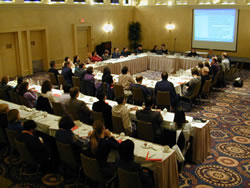|
|
|
International Team Research Workshop #7 |
||||
|
When: February 12 - February 16, 2001 Where: Crowne Plaza Hotel Georgia, Vancouver, BC, Canada Attendees: Richard Blake, Annalia Bonella , Jana Buhlmann , Paolo Buonora, Marnie Burnham, Michele Cloonan, Barbara Craig, Luciana Duranti, Terry Eastwood, Philip Eppard, Sharon Farb, Gigliola Fioravanti, Normand Fortier, Mark Giguere, Anne Gilliland-Swetland, Maria Guercio, Yvette Hackett, Hans Hofman, Torbjörn Hörnfeldt , Livia Iacovino, Agnes Jonker, Brent Lee, Rich Lysakowski, Heather MacNeil, Christine Petillat, Tom Quinlan, John Roeder, Seamus Ross, Ken Thibodeau, Bill Underwood, Bruce Walton, Tahra Fung, Kevin Glick, Jean-Pascal Morghese, Peter Van Garderen, Lisa Beitel, Deirdre Bryden, Yau Min Chong, Robert Edwards, Anna Gibson, Prisca Giordani, Monica Greenan, Erica Hernandez, Robyn Hulley, Francesca Marini, Ian McAndrew, April Miller, Eun Park, Alex Richmond, Sion Romaine, Shelby Sanett, Claire-Yasmina Veisseire, Julio Vera, Lara Wilson, Jane Zhang Workshop Objectives:
Summary: Research workshop #7 provided the opportunity for task forces to continue their individual activities as well as begin to bring their work together in a collaborative manner. The Authenticity Task Force discussed recently-completed case studies, and reviewed the Draft Requirements in light of both new data gathered in Round 3, and comments provided by the Chair of the Preservation Task Force. Authenticity Task Force members also continued their consideration of how to construct a typology of electronic records, listed several terms for proposal to the Glossary Committee, and discussed procedure and deadlines for Round 4 Case Studies. The principal work of the Appraisal Task Force involved continuing to refine its activity model, and considering it in relation to the model being created by the Preservation Task Force. In addition, Task Force members set dates and an agenda for a meeting in late-April 2001. Tasks scheduled for this meeting included beginning to translate the concepts represented in the appraisal model into recommendations for the Strategies Task Force, testing the model by conducting a "walkthrough" of Case Study 19, and assignment of responsibilities for writing narratives to accompany the model. The Preservation Task Force devoted most of its attention to improving the preservation model, and attempting to validate the model and identify areas needing further consideration by walking Case Study 19 through the current draft. Members of the Task Force also agreed on a set of terms for proposal to the Glossary Committee, and met with members of the Authenticity Task Force to discuss concerns about the Draft Requirements and the typology of electronic records. The Glossary Committee approved several procedural measures to improve grammatical and stylistic consistency within the Glossary and agreed on a policy for situations in which different Task Forces propose conflicting definitions for the same term. The decision on whether to create a web-enabled version of the Glossary was put aside for further consideration. The Strategies Task Force (formerly Domain IV Task Force) determined that its work could not commence until results were available from the other Task Forces. However, the Task Force clarified its charge and established an action plan specifying deadlines for reporting by the other Task Forces. The action plan also set a procedure according to which members of the Strategies Task Force will prepare an outline of the intellectual framework guiding the development of policies, strategies, procedures, and standards by distilling the recommendations of the other three Task Forces; members of national and multinational teams will review those recommendations, and the distillation of principles and criteria, within their respective contexts; and members of the Strategies Task Force will review the final reports of the Task Forces, and the final reports of the research teams, and finalize the intellectual framework. In its final meeting, the International Team received reports from the Task Forces and the Glossary Committee, and approved the action plan proposed by the Strategies Task Force. Additionally, a tentative list of attendees to the Beijing meeting was created, and plans for InterPARES 2, including the funding-application process, were discussed. Workshop #7 also featured a site visit by a peer review committee of the Social Sciences and Humanities Research Council (SSHRC), the Government of Canada funding body which has supported the Canadian Team's financial contribution to InterPARES. Members of the Committee met with the International Team, project staff, and project research assistants on Wednesday February 14. Its Site Visit Report to the Major Collaborative Research Initiatives (MCRI) program of SSHRC indicated that committee members were "very impressed" with the InterPARES Project, and regarded it as "a world-leader in undertaking work in a new and crucial area." Next International Team Workshop: Washington, DC, USA (June 18-22, 2001)
|
||||
|
|
||||

